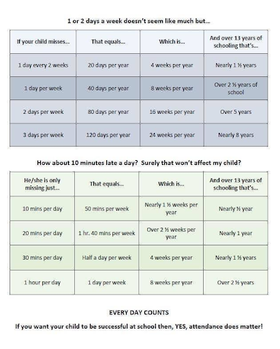One of the most important things your child can do to reach the goal of success is also one of the most basic: attend school every day on time! By attending class regularly, your child is more likely to keep up with daily lessons and assignments and take quizzes and tests on time. Research has shown that your child's regular attendance may be the greatest factor influencing his/her academic success.
Some of the greatest benefits for attending school regularly are:
Achievement:
Students who attend school regularly are more likely to pass reading and math assessments than students who do not.
Opportunity:
For older students, being in school every day gives them a chance to learn more about college and scholarship opportunities and to learn the important information to build a successful academic record.
Exposure to the English language:
Regular school attendance can also help students who are learning English by giving them the opportunity to master the skills and information they need more quickly and accurately.
Being part of the school community:
Just by being present at school, your child is learning how to be a good citizen by participating in the school community, learning valuable social skills, and developing a broader world view.
What parents can do:
Follow the school's guidelines and attendance policy and report excused absences. At the beginning of the school year, review the school's rules and make sure you understand who you need to contact if your child is going to be absent.
Check homework. Check each night to see that your child understands and completes the day's homework assignments.
Take an active role. Stay involved with your child's daily experiences at school by asking how the school day went, and then listening carefully to what your child shares with you — both the successes and struggles. Make it a point to meet your child's teacher(s) and friends.
Locate potential sources of anxiety. If your child frequently appears upset or reluctant to go to school and cannot tell you why, schedule an appointment with his or her teacher or a member of your child's student support team (School Counselor) to talk about possible sources of the anxiety.
Keep updated on school events and announcements. Read the school documents that your child brings home and take note of important announcements and dates, such as back-to-school night and parent-teacher conferences.
Try to limit the amount of time that your child misses school due to medical appointments or illness. If possible, avoid scheduling doctor's appointments during the school day. Allow your child to stay home only in the case of contagious or severe illnesses.
Schedule family events with your child's school schedule in mind. Plan holiday celebrations or family trips during weekends or school vacations. In the case of family emergencies or unexpected trips, talk to your child's teacher(s) as far in advance as possible and set up a way that your child can work ahead or bring important homework on the trip.
Plan ahead. Encourage your child to prepare for the next school day by laying out clothes the night before and helping to fix lunches.
Promote good health. Make sure that your child eats a balanced diet with plenty of fruits and vegetables, and has opportunities to exercise every day through a sports team or playtime outside. Make sure that your child can relax before bedtime by doing something quiet like reading rather than doing something stimulating, like watching television or playing video games. Ensure that your child gets enough quality sleep. Getting enough sleep will help him/her get up on time, be refreshed in the morning, and feel ready for a full day of learning ahead!
Help your child get to school on time every day. Teach your child how to use and an alarm clock, and keep the television turned off in the morning.
Promote the importance of education: Teach your child how important education is to their future success by stressing the importance of regular school attendance. Let your child know that attending school regularly will assist him/her in developing good habits they need for college and/or the work force.
Reinforce other important behavior patterns: Establishing a regular attendance pattern encourages the development of other important patterns of behavior like reliability, being on time and good time management skills.


